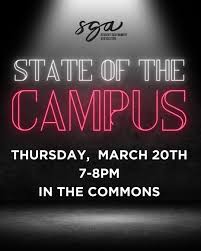SGA’s State of the Campus allows campus leadership to share their projects and visions for the future.
Student Government Association (SGA) hosted a State of the Campus event to update the student body on what has been happening around campus this academic year. The event allowed various departments to share the projects they are working on and their visions for the future.
Dr. Aly Williams, Vice President of Academic Affairs, discussed revisions to the university’s general education curriculum. The revisions aim to create more transfer-friendly credit options and give students greater choice in general education requirements.
Student Body President Grace Huizingh and Vice President Josh Cartwright highlighted several achievements, including increased voter participation in campus elections and new student organizations including the Asian Student Organization and Men’s Volleyball team.
Huzingh and Cartwright also announced upcoming campus improvements, including new pickleball courts and renovations to Teeter Cafe. Returning students can expect an opening ceremony or tournament in the fall to celebrate the new pickleball courts.
President Jon Kulaga discussed the university’s $85 million Momentum Plan with 12 key initiatives. The plan includes launching a statewide vocational school for automotive technicians and developing a hospitality management program with an on-campus hotel.
Jonathan Mpanzu addressed misconceptions about the IGO office, stressing that their spaces and programs are inclusive for all students.
“There are some students who have been here for four years, and all they know about IGO is that it’s called IGO. There’s nothing else they know about it,” Mpanzu said.
Mpanzu reinforced the IGOs office’s commitment to campus diversity, sharing its three core values: celebrating diversity, creating opportunities and cultivating belonging.
Spiritual Formation Director Spencer Loman introduced a new community engagement pastor role, emphasizing the office’s commitment to mobilizing students for local and global service.
Loman shared his desire for students to contribute to the place that they call home for four years.


